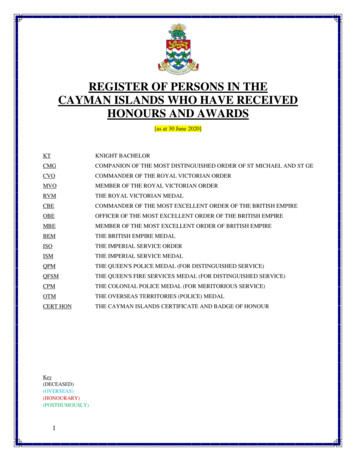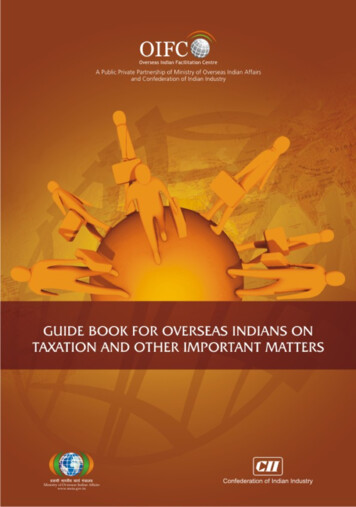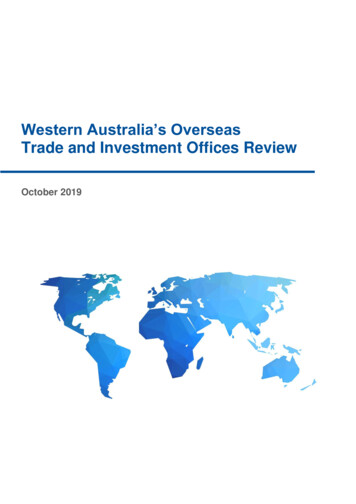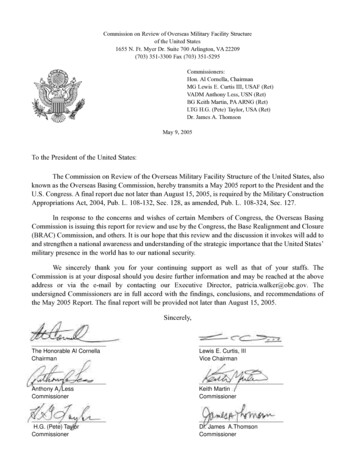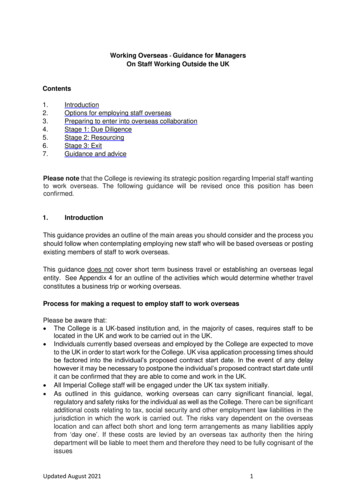
Transcription
Working Overseas - Guidance for ManagersOn Staff Working Outside the UKContents1.2.3.4.5.6.7.IntroductionOptions for employing staff overseasPreparing to enter into overseas collaborationStage 1: Due DiligenceStage 2: ResourcingStage 3: ExitGuidance and advicePlease note that the College is reviewing its strategic position regarding Imperial staff wantingto work overseas. The following guidance will be revised once this position has beenconfirmed.1.IntroductionThis guidance provides an outline of the main areas you should consider and the process youshould follow when contemplating employing new staff who will be based overseas or postingexisting members of staff to work overseas.This guidance does not cover short term business travel or establishing an overseas legalentity. See Appendix 4 for an outline of the activities which would determine whether travelconstitutes a business trip or working overseas.Process for making a request to employ staff to work overseasPlease be aware that: The College is a UK-based institution and, in the majority of cases, requires staff to belocated in the UK and work to be carried out in the UK. Individuals currently based overseas and employed by the College are expected to moveto the UK in order to start work for the College. UK visa application processing times shouldbe factored into the individual’s proposed contract start date. In the event of any delayhowever it may be necessary to postpone the individual’s proposed contract start date untilit can be confirmed that they are able to come and work in the UK. All Imperial College staff will be engaged under the UK tax system initially. As outlined in this guidance, working overseas can carry significant financial, legal,regulatory and safety risks for the individual as well as the College. There can be significantadditional costs relating to tax, social security and other employment law liabilities in thejurisdiction in which the work is carried out. The risks vary dependent on the overseaslocation and can affect both short and long term arrangements as many liabilities applyfrom ‘day one’. If these costs are levied by an overseas tax authority then the hiringdepartment will be liable to meet them and therefore they need to be fully cognisant of theissuesUpdated August 20211
The College is reviewing its position on overseas based work and, in the meantime, allrequests (i.e. new requests and requests to extend existing arrangements) are beingcarefully considered by HR, Staff Compliance and Finance experts, before a final decisionis made. Permission to work overseas must be requested in advance and will only begranted in exceptional circumstances.It is not permitted to engage Casual Workers to carry out work overseas. Any requests willtherefore not be considered.If, as a Line Manager, you believe that exceptional circumstances to permit an employeeto work overseas apply, you must submit a request by following the steps below:Line Managers: Review this guidance, paying particular attention to the due diligence section, irrespectiveof the expected duration of the overseas work Complete the Overseas Working Request Form (and any associated forms) and email toyour Head of Department for their consideration in the first instanceHeads of Departments: Review this guidance, paying particular attention to the due diligence section, irrespectiveof the expected duration of the overseas work Review the Overseas Working Request Form (and any associated forms) carefully Where you support the request, complete the HoD Authorisation section and emailoverseas-working-requests@imperial.ac.uk for reviewThe Overseas Working Requests inbox will be monitored and will pick up request forms to: Review fully completed requests on a regular basis Seek input from HR, Staff Compliance and Finance experts Confirm the College’s final decision as soon as practicable following review2.Options for employing staff overseasThere are a number of options where we need work to be performed abroad. For each of theseoptions, before agreeing on a contract type, it is important to explore the nature of the contract,in order to understand any implications/liabilities it may entail. The most frequently usedcontract options are summarised below, a more detailed list of options is available at Appendix2: College members of staff assigned or seconded overseasWhere newly appointed or existing staff are either employed directly by the College orseconded to a partner organisation, they will be employees of the College and their termsand conditions determined by the College. Where possible, the employee will be paidthrough the College’s payroll in the normal way, but if overseas taxes or social securitycontributions are required it may be necessary to use an international payroll bureau.College salaries are always issued in Pound Sterling (GBP) but can be paid to overseasbank accounts if required. Conversion to the recipient bank currency will be based uponthe exchange rate between the issuing and receiving banks. The College will not makeany adjustments to pay based on exchange rates.The health and safety responsibilities for College staff abroad remain exactly the same asif they were in the UK or on College property.Updated August 20212
Employees on local terms and conditionsWhere individuals are employed on local overseas terms and conditions and paid in thelocal currency, this can be undertaken directly by the College or through a partnerorganisation. Where an employee is directly employed by the College, the services of apayroll bureau or partner organisation will normally be utilised to facilitate the appropriatepayment of the member of staff working overseas. This will incur an additional cost thatwill have to be paid for by the employing department. Specialist legal advice, the cost ofwhich will be met by the department, will also be needed to ensure that the contract ofemployment meets the requirements of the country. It is expected that the linemanagement responsibilities laid out in College safety policy will apply to local overseesstaff, as far as it is reasonably practicable to do so. Consultants/Self-employed contractorsWhere a service is being provided, a genuine self-employed contractor may be engagedthrough a contract for services or consultancy agreement. In this instance the individualwill not be an employee of the College, and would be responsible for making their ownarrangements to pay any local taxes or social security contributions required in the countryin which they are working and purchase their own insurance cover.3.Preparing to enter into overseas collaborationDue to the potential additional risks and costs of employing staff to work overseas, as a firststep you should discuss your intentions with your Head of Department/Faculty for their writtenapproval. As part of this discussion you should cover the following topics: The rationale behind entering into the proposed collaboration, which may require staffto be employed or seconded overseas; orYour reasons for wishing to undertake a research project/project overseasHow the collaboration and research/project fits in with the College’s/Faculty’s overallresearch/teaching strategyHow the additional costs will be met, i.e. travel insurance, payroll bureau, etc.A Health and Safety risk assessment of the proposal must be completed, during whichthe academic benefit is weighed against the risk of harm. Risk assessment templates,Emergency response protocol templates and guidance are available on the CollegeSafety Department web pages. You should also consult with your local safety officer.The duration of the assignmentAt the end of the discussion, if your Head of Department/Faculty agrees that the overseascollaboration or research/project should proceed, you should then contact your DepartmentalOperating Manager to assist you with working through the next stages as set out below. Itshould be noted that all due diligence related costs incurred must be met by the department.4.Stage 1: DUE DILIGENCE4.1Establish where the work needs physically to be doneIf it is likely to be in several different countries (but performed by one individual), it is importantto estimate the proportion in each. This is critically important for everything that follows.Updated August 20213
4.2Undertake an initial risk assessment.A country specific assessment will need to be carried out to examine the risks andopportunities associated with an overseas collaboration, which could lead to you employingstaff to work overseas or sending an existing member of staff overseas.4.3Health and safety.A risk assessment for the offsite work must be completed and submitted to your local safetyadvisor and the Head of Department. Risk assessment templates are available from theSafety Department’s offsite working web pages. Action will also need to be taken to ensurethe College complies with any local legislative requirements relating to Health and Safety,therefore, it may be necessary to procure specialist health and safety advice from relevantCollege advisors. Where College staff are employed through a partner organisation orseconded overseas it is important to ensure that the responsibilities of both the College andthe partner organisation are clarified.4.4 Investigate the legal framework and context for employing staff in the host country.Specialised country-specific legal advice is likely to be needed and this will be sought by HR.The cost of legal advice will be covered by the department. This will include the following:4.4.1 Establishing if there will be any restrictions on academic freedom in the hostcountry.4.4.2 Establishing if there will be cultural differences that members of staff will need tobe briefed/trained on.4.4.3 Establishing current immigration requirements and obligations and ensuring thatthey are complied with.Permission to work or a visa may be required for members of staff in order to work overseas.This will depend on the individual’s nationality and the country in which they will be based.Where the individual is not a British or Irish national and needs a visa in order to enter andundertake work in the UK, please discuss this with the Staff Compliance team as soon aspracticable in order to establish the best UK visa/immigration status to suit the individual’scircumstances.Please note that the individual will not be permitted to start working overseas until theyprovide evidence to the Staff Compliance team that they have submitted their UK visaapplication in order to provide a level of assurance that they are likely to obtainpermission to work in the UK.Where the individual is not a British or Irish national who holds a current UK visa, pleasediscuss your proposals with the Staff Compliance team as the period of time they workoverseas may also have implications for their current UK visa/immigration status, particularlyif this expires whilst they are out of the UK, and future applications for Indefinite Leave toRemain, EU Settlement Scheme, etc. Where the individual is a sponsored worker who holdsa current Tier 2/Skilled Worker or Tier 5/Temporary Worker (Government AuthorisedUpdated August 20214
Exchange) UK visa, please discuss this with the Staff Compliance team asap as any changeof circumstances must be reported to the UKVI within 10 working days.4.4.4 Establishing what local employment laws will apply that may affect both themember of staff and the College and what the member of staff’s employment rights andobligations will be with regards to contractual issues and statutory rights.For example, within Europe the Posted Workers Directive (1996) provides protection toworkers being posted to another European Union member state for up to one year to ensurethe terms and conditions of work meet the legal minimum of the country to which they areposted. This means that members of staff could potentially be entitled to enhanced terms andconditions e.g. maternity leave. Workers posted overseas from the UK may still have statutoryrights under domestic employment law e.g. the right to claim unfair dismissal regardless of theapplication of the Posted Workers Directive.The governing law of the employee’s contract of employment, any mandatory local labour lawsand the jurisdiction for settling disputes should all be considered.4.5Establishing if there are any travel restrictions associated with the destinationcountry.This should form part of the Health and Safety risk assessment. The Foreign andCommonwealth Office, the College's Insurers, Safety Department offsite work and theCollege’s Insurance office web pages should all be consulted and further advice sought wherenecessary.4.6Establishing if there are any restrictions on the type of activity.This should form part of the Health and Safety risk assessment. Consult with your SafetyOfficer for further information.4.7Establishing if there are any sanctions or trade embargos, ethical or humanrights issues associated with the host country.This should form part of the Health and Safety risk assessment.4.8Establish what the tax framework/social security situation is in the host country.It is essential to seek specialist tax advice at an early stage, from the Payroll & PensionsManager in the first instance. This will include:4.8.1 Check the taxation position and ensure appropriate arrangements are in place.When a member of staff is paid in the UK and is working overseas, they may remain liable topay tax and social security on their earnings in the UK. Conversely the member of staff andthe College may also become liable for tax and social security in the country that they areworking. As tax rules differ from country to country it may be necessary to procure specialistservices to advise, calculate and ensure appropriate tax is paid in the overseas territory. It isgenerally the Payroll & Pensions Department’s responsibility to determine whether a memberof staff based overseas can be paid through the College payroll or if an overseas payrollagency will be needed.Updated August 20215
4.9Check the pension position.There may be implications for eligibility to join or remain in a specific pension scheme for staffbased overseas.The College may choose not to admit any employee into a UK pension scheme who carriesout their day-to-day work in any country other than the United Kingdom, unless that person: is seconded for a limited period (generally no more than 5 years), was employed by the College in the United Kingdom prior to the commencement of thesecondment will return from that secondment to work for the College in the UK or will fully retire directly from that secondment.If the member of staff is based outside of the UK, the College will need to assess their positionwith regards to eligibility for pension scheme membership.Further information about pensions can be obtained via the Staff Hub.4.10 Check that all relevant insurance is in place.Insurance requirements for staff based overseas will be affected by the period of time thatthey are based overseas and the country within which they are based, the overseas trip orplacement needs to be registered using the link from this ervices/insurance/Staff away from the UK for a period of over 12 months are classified for insurance purposesas being secondees and there are some restrictions in respect of Medical and EmergencyTravel Expenses such as routine medication. Contact the Insurance Manager for furtherdetails.4.11 Check how the member of staff will be able to access a doctor or healthcareoverseas.This check should form part of the offsite work health and safety risk assessment. Anemergency response protocol should also be completed. Please refer to your Safety Officerand the College Safety Department web pages for guidance and advice.A Hazard and Risk Identification for Fieldwork Activities (FW1) form must be completed inconjunction with the associated relevant detailed risk assessment forms and in relation to theCollege guidance on offsite working.4.12Check how the member of staff will purchase items/ kit needed for the researchIf there is likely to be a requirement that items or equipment needed for the research are tobe purchased in country, it should be established how this would work in advance as somecountries require purchases to be made mainly in cash. If this is the case the Purchasingsection should be consulted.4.13Ensure that no data protection principles are breached.Under the General Data Protection Regulation, where personal data is transferred out of theEuropean Economic Area (EEA), the College must ensure that the recipient country providesan adequate level of protection for the data and that the individual to whom the data refers isaware that their personal information will be sent outside the EEA.Updated August 20216
Stage 1 SummaryIt cannot be stressed enough that specialist legal and tax advice may be required to avoidpotential problems later on. These costs will need to be covered by the grant or allocatedbudget.The completed due diligence should be discussed with your Departmental Operating Managerand Head of Department and agreement reached on whether the overseas research/projectshould proceed. If the decision is taken that the research/project should proceed, you andyour Head of Department must complete the Overseas Working Request Form and forward itto overseas-working-requests@imperial.ac.uk for review, prior to starting the resourcingprocess. Confirmation on the College’s final decision will follow as soon as practicable,following review and any additional sign-offs that may be required from the Faculty andProvost’s Board.5.Stage 2: RESOURCING5.1RecruitmentHR will advise on the employment law provisions that apply in the host country together withadvice on recruitment and selection and appropriate contractual arrangements. Please note:if this results in additional costs the Department/Faculty will be charged.Regardless of whether UK staff are transferred overseas or recruited locally, it will benecessary to consider who will manage and supervise these individuals, for example, tomonitor performance and deal with disciplinary and complaints or conflict issues. In additionprovision will need to be made for the training and development of UK staff who are workingoverseas temporarily, with particular emphasis on cultural awareness familiarisation, prior toany overseas work commencing. As the line manager you will also need to consider how youwill communicate and engage with staff overseas to ensure good employee relations areestablished and maintained.5.2Seconded EmployeesWhere an employee is seconded to a partner organisation or employed through the partnerorganisation agreements will need to be in place to clarify the responsibilities of the Collegeand the partner organisation. This is to ensure that areas such as intellectual property rights,health and safety, dispute resolution or termination of the agreement are clarified before thesecondment is taken up. It should also be noted that the law of some countries (e.g. UAE)does not allow overseas staff to be seconded into the country, i.e. staff must be employed bya local organisation.5.3Employment ContractThe employment contract needs to cover all relevant issues specific to both the move overseasand any eventual return to the UK.Where employees are recruited to work overseas for more than one month, the followingdetails must be given in their employment contract:Updated August 20217
the period for which the employee is required to work outside the UK;any additional remuneration and benefits to be provided as a result of the overseasassignment;any terms and conditions relating to the employee’s return to the UK.If the need to work overseas arises after the employment contract has been signed, theCollege must provide the employee with details of the changed terms by the earliest of: 2 months after the date on which their employment began;1 month after the change was made to the terms;The date on which the employee departs overseas.As the employee’s consent to the changes must be obtained, a contractual change lettersetting out the changes to their terms and conditions of employment will be issued and mustbe signed by the employee.5.4Cultural differencesIt is important that the implications of cultural differences may have for the project areunderstood and should be considered as part of your Health & Safety risk assessmentwhere appropriate.See Appendix 3 for an overview of some ways in which culture might differ from country tocountry.5.5Managing the overseas research or project from the UKAn offsite work supervisor should be established within the UK based Department that isconducting the offsite work. Please refer to the Offsite Working policy for further information.5.6Monitoring the operation of the international projectA mechanism should be in place to regularly review the operation of the project during itslifetime. Any partnership agreements should not be allowed to roll on from year to year withouta formal review.6.Stage 3: EXIT6.1What happens if things go wrong?If a dispute arises, do not ignore it. Firstly, check the documentation that exists. If you havedone your preparatory work prior to setting up the overseas assignment, you should alreadyhave an agreed dispute resolution mechanism with a clear indication of the jurisdiction/lawthat will apply when managing the dispute. If no agreement is reached or it is agreed that theoverseas jurisdiction should apply then early legal advice is essential as is notifying your Headof Department and Faculty Dean.6.2Ending of the overseas agreementUpdated August 20218
As the overseas secondment/employment is nearing its end you will need to give considerationto ending the overseas agreement and repatriating the member of staff back to the UK, unlessthey are a locally employed individual, and terminating their contract of employment.When considering ending an international agreement you will need to consider: Any local regulations relating to employee consultation on redundancy or TUPEregulation, alongside College policies and procedures as applicable. What notice period applies. The process for repatriating a member of staff at the end of an overseas assignment. Other factors such as: The time and support the employee will need for completing work, settling bills, closingbank accounts and relocating their family. Where a member of staff is being repatriated, whether the College needs to considerproviding any transitory arrangements, such as temporary accommodation, schooling andhousing.6.3Emergency evacuation proceduresIn the event that the security or political situation in the country deteriorates to a point that it isno longer safe to operate, plans need to be in place to ensure the safety of the member ofstaff. This may differ between British and Irish nationals and other nationalities but should beagreed in advance.UK nationals would normally return to the UK. Non-UK nationals may not wish to do this ormay not be permitted to do so due to UK visa and entrance requirements.Please ensure that you complete an Emergency Response Protocol form before travel.Discuss its contents with your line manager and your Safety Officer. Ensure that yourcolleagues abroad are aware of its contents and that a copy is left with your offsite worksupervisor in the UK.7.Guidance and advice Faculty or Campus Safety Officer Offsite Coordinator HR – HR Partners or HR Recruitment/Staff Hub Staff Compliance – Pippa Chalmers, Head of Staff Compliance, email:p.chalmers@imperial.ac.uk Safety Department: ff-siteworking/ College Insurance – es/insurance/Updated August 20219
Tax office – Manchester Chapel Wharf Area, Trinity Bridge House, 2 Dearmans Place,Salford, M3 5BS. Telephone: 0845 300 0627. College reference: 951/C1YYPayroll – Steven Howes, Payroll & Pensions Manager, email: s.howes@imperial.ac.ukPensions – Carey Southward, Senior Pensions Specialist, email:c.southward@imperial.ac.ukRisk Management – Paul Manning, Interim Director of Risk Management, email:p.manning@imperial.ac.ukSecurity Control (in an emergency): 020 7589 1000 or direct on extension 4444Foreign Commonwealth Office web pagesUpdated August 202110
Appendix 2: types of overseas assignment and possible approaches to benefitsGlobalMobilityPolicyShort TermCommuterSecondmentEmploymentStatusRemains an ImperialemployeeDurationIntended duration of Intended duration ofup to one yearone to five yearsSecondmentBaseSalary Home country salaryStructurecontinued(NBpossible tax issues ifrechargedtohost country)Updated August 2021Remains an ImperialemployeeHome country salarycontinuedLong Term SecondmentPermanent TransferHost based approachHome based approachTransfer to host entitywith right of return toImperial at end of fixedperiod of host countryemploymentContinues in Imperialbut no guarantee ofreturn to the samepositionaftertheassignmentbutcontinuity of servicerecognisedPermanentortemporaryemployee of host entity withpermanent transfer, possiblyrecognising prior Imperialservice as continuousIntended duration ofone to five yearsIntended duration ofone to five yearsIndefiniteSalary aligned to hostcountry entity salarystructure (DestinationPay) wherever there isan established hostentity presenceSalarybasedon Host entity salary structureImperial salary levelandadjustedfordifferentials in cost ofliving and housing114131-2231-8346.1
PayrollDeliveryContinuehomecurrency on homepayrollforbasesalary.Perdiemprotected in hostcountrycurrencyusually expensed inon home expensessystemContinuehome Host currency via host Paid via home payroll if Host currency via host entityongoing homecurrency on home entity payrollpayrollcountry employmentpayroll for base salarywith per diem protectedinhostcountrycurrency usually paidvia expense systemHousingAllowanceProvided in hotel orsimilarProvided in hotel orsimilarDifferential between Host country rented Temporary housing only for 4weeks – discretionaryowned and rented on less home countryhousing contributionthereafterdiscretionary basisHome LeaveOnce a monthOnce a weekOne per completed One per completed N/Aassignment year for assignment year foraccompanying familyaccompanying familyIncentivesHardship to selectedcountriesHardship to selectedcountriesHardship to ocationPackageN/AUpdated August 2021country Home country where Host country schemepossibleuptomaximum time limit.N/AStandardrelocationpackage12Hardship to selectedcountriesN/AHome country where Host country scheme.possibleuptomaximum time limit.Liability also for hostcountry social securityinnon-reciprocalagreement countries.StandardrelocationpackageStandard relocation packagewith home sale and homepurchase support ondiscretionary basis4131-2231-8346.1
PredepartureImmigrationSupportExternal matic right towork in host country(e.g. within EU).External matic right towork in host country(e.g. within EU).External assistance toobtainworkpermit,unless employee hasautomatic right to work inhost country (e.g. withinEU).External assistance toobtainworkpermit,unless employee hasautomatic right to work inhost country (e.g. withinEU). Also applies topartner where possible.External assistance toobtain work permit foremployee and partnerwhere possible.Residency applicationsalso supported with 'clawbacks' in case employeeleaves.PreAssignmentVisitNoNoProvided where assigneeis not familiar with hostcountry, usually returnflightsplushotelaccommodation,withmeals or Per DiemAllowance for 5 days.Provided where assigneeis not familiar with hostcountry, usually returnflightsplushotelaccommodation,withmeals or Per DiemAllowance for 5 days.Provided where assigneeis not familiar with hostcountry, usually returnflightsplushotelaccommodation,withmeals or Per DiemAllowance for 5 days.RelocationSupportNoRelocationconsultant for homesearch, usually 2-3days home searchand 1 day settling inservice, depending onlocationRelocation consultant forhome and school searchif appropriate, usually 2-3days home search and 1day settling in service.School search usuallycarried out and chargedseparately.Relocation consultant forhome and school searchif appropriate, usually 2-3days home search and 1day settling in service.School search usuallycarried out and chargedseparatelyRelocation consultant forhome and school search ifappropriate, usually 2-3days home search and 1day settling in service.School search usuallycarried out and chargedseparatelyUpdated August 2021134131-2231-8346.1
CulturalTrainingNoNoExternal training providedwherehostcountrypresents major culturaldifferences and assigneenot familiar with newlocation.External training providedwherehostcountrypresents major culturaldifferences and assigneenot familiar with newlocation.External training providedwherehostcountrypresents major culturaldifferences and assigneenot familiar with newlocation.LanguageTrainingProvided as neededProvided as needed.Provided as needed.Provided as needed.Provided as needed.Updated August 2021144131-2231-8346.1
Appendix 3: some ways of describing differences in culture between countriesInequalityCore ValueCore ValueCore DistinctionCore DistinctionRespect for smIndividual FreedomLong Term BenefitsDoes it serve a purpose?ExplorationRisk TolerantUrgent/Can WaitIdentityGroup HarmonyCollectivismInsider/OutsiderMe/OthersLong TermEqualityResponsible or not for Task XPowerful/DependentRisk AverseEquality between peopleVirtueSaving FaceShort TermProper/Improper15
Appendix 4: the difference between business trips and working overseasBusiness TripP
Complete the Overseas Working Request Form (and any associated forms) and email to your Head of Department for their consideration in the first instance Heads of Departments: Review this guidance, paying particular attention to the due diligence section, irrespective of the expected duration of the overseas work







